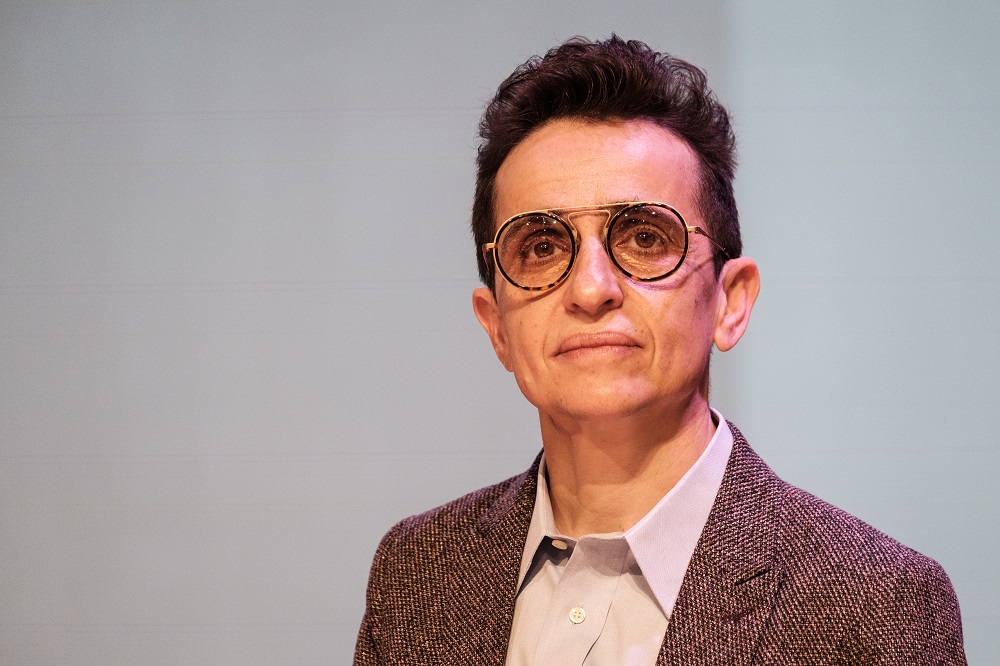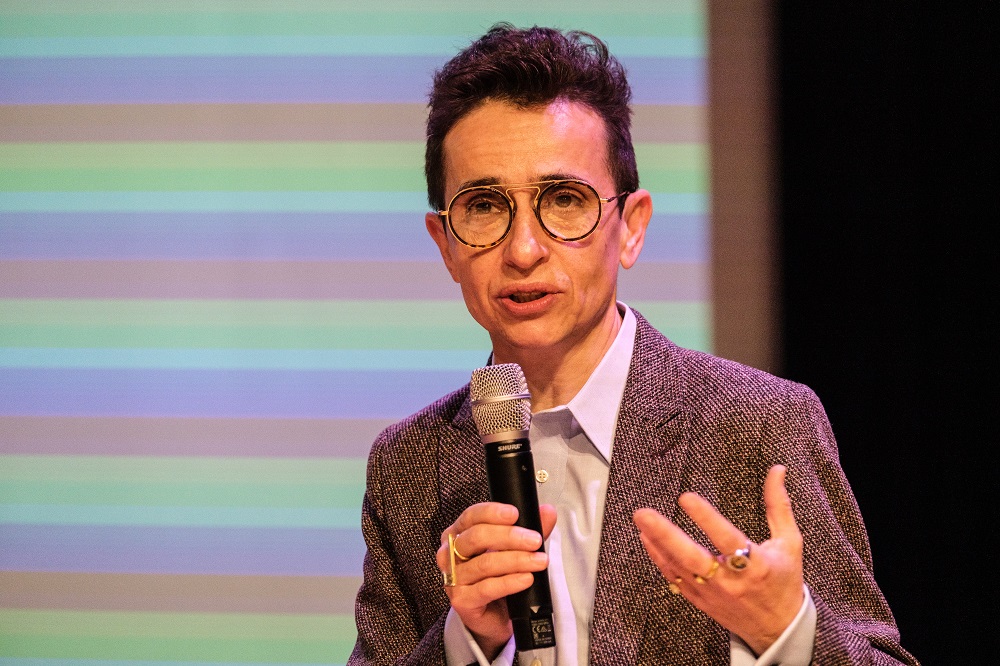Masha Gessen: ‘Besides military weapons, lies are Putin’s greatest weapon’
How do you survive in an autocracy? Masha Gessen should know: the journalist fled from Putin’s Russia to the United States, only to be confronted with Donald Trump. During a Q&A at the Black Box, Gessen dissects how autocrats violate language and what it means to live in a democracy.

Leave it to Masha Gessen to write survival tips for people facing autocratic powers. Gessen (b. 1967), who identifies as nonbinary, grew up in the Soviet Union where they reported on the resurgence of totalitarianism in Vladimir Putin’s Russia. After Putin found a new target in the then Russian lhbti community and made personal threats to Gessen, the journalist fled to the United States in 2013 with their wife and three children.
Gessen, staff writer at The New Yorker, has written 11 books, including The Man Without a Face: The Unlikely Rise of Vladimir Putin, The Future Is History: How Totalitarianism Reclaimed Russia, and their latest title Surviving Autocracy. Gessen recognizes and analyzes the characteristics of an autocracy, where power is in the hands of one person, and sees many similarities between Trump and Putin.
In a cold but well-filled Black Box, Masha Gessen carefully addresses a group of attentively listening (international) students. Like the journalist, they are concerned about Putin, the war in Ukraine, and the consequences of Trump’s possible re-election. Gessen’s appearance was organized by Shift Talks and Tilburg University.
Indignation
One day after the 2016 election of Donald Trump, Gessen described, in an essay, six ways to survive an autocracy. One of them is to be indignant. An outrage that Gessen said, however, should not be directed at Trump and his supporters. “My outrage is directed at Trumpism and the way Trumpism, among other things, degrades language and the way we talk to each other.”
Trump’s autocratic grab for power began with a war on words, Gessen wrote in their last book. “One example is the shift in the way Americans have come to talk about immigration during Trump’s presidency. Terms like ‘illegal immigrants’ and ‘closed borders’ became legitimate as the Trump administration continually used them in an effort to strip specific groups of people of their rights. According to Trump, of course, this was all in the interest of national security.”
Language abuse
Gessen experienced in Russia what it means when language is abused by a regime. “In Surviving Autocracy, I write about restoring language. Before working in Russia, I was a journalist in the United States for several years. This allowed me to compare the use of language in the two countries. I realized how limited Russian journalists were because so many words had been taken out of circulation. No one wanted to use them anymore after they were used by the totalitarian regime to oppress and make people obey. So the Russian vocabulary had been drastically reduced, but as an English-speaking journalist, I was able to have many more words at my disposal and write with empathy and idealism, for example.”

“Under Trump, I saw the same thing happen with language. He is not the first president to do this, but he has done violence to language and normalized it very quickly. By using a word like migrant and not refugee or asylum seeker, he portrays people who are in need and have the right to seek asylum at the border very differently. Maybe not everyone is aware of it, but the terms migrant, refugee, and asylum seeker really have a different meaning in the English language.”
Lying presidents
In their book, Gessen devotes a chapter to the constantly lying Trump, who uses his power to lie. Trump lies about the weather, Gessen writes, for example, about the weather during his inauguration. Why would anyone lie about the weather? Anyone can see what the weather is. To lie about the weather, you must be a strange kind of liar, Gessen said. During his presidency, and after, Trump did everything he could to impose a Trumpian reality on everyone. With the concept of fake news and by talking about alternative facts, he changed the meaning of crucial concepts.
Putin also uses what Gessen calls the “power lie”: using your power to lie. “Besides military weapons, lies are Putin’s greatest weapon. With propaganda and lies, he justifies the war in Ukraine. In doing so, Putin uses contradictory claims that are all absurd and insane. Timothy Snyder (American professor of history, ed.) coined a good term for what Putin is doing: schizo-fascism. That is, the one who behaves fascist accuses his opponent of fascism, as Putin does with Ukraine.”
“Personally, I think Russia is acting fascist right now. To anyone who claims this, Putin will shout that not he but rather they are Nazis. And because he has great reach and control over all Russian media, the Russian people think they are currently liberating Ukrainians from a fascist regime.”
The future of democracy
What the future of democracy looks like? Gessen doesn’t know. “Most people don’t know exactly what a democracy is, including me. Usually we mean a country in which people can vote freely. But describing a democracy as a system in which elections are held and people can vote is too limited and inaccurate.
“Maybe we should use our imagination more in this from now on. I imagine that, in the future, we will come up with a more sophisticated form of democracy. For example, one in which we define democracy as the conversation about how we live together in cities, countries, or on this planet.”
Because Gessen identifies as non-binary, the editors chose to use as personal pronouns they/their.
Translated by Language Center, Riet Bettonviel






